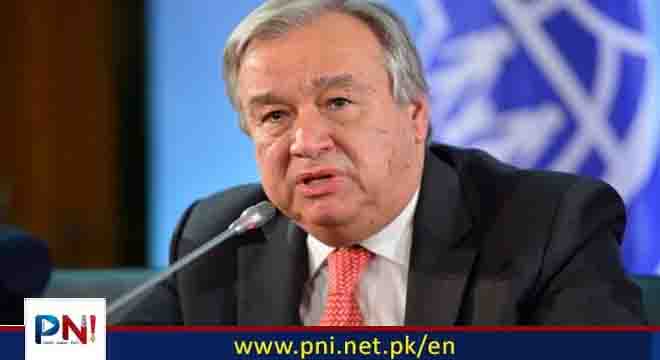UNITED NATIONS, Oct 08 : UN Secretary-General Antonio Guterres said on Tuesday he has sent an urgent letter to Israeli Prime Minister Benjamin Netanyahu, warning him that the draft Israeli legislation to prevent the U.N. Palestinian refugee agency (UNRWA) from carrying out its humanitarian operations in the occupied Palestinian territory would be a “catastrophe.”
“Such a measure would suffocate efforts to ease human suffering and tensions in Gaza, and indeed, the entire Occupied Palestinian Territory. It would be a catastrophe in what is already an unmitigated disaster,” he told reporters at UN Headquarters in New York.
In July the Israeli parliament gave preliminary approval to a bill that declares UNRWA a terrorist organization and proposes to sever relations with the body. Israeli leaders have accused UNRWA of collaborating with Hamas in Gaza.
“That’s why I have written directly to Israeli Prime Minister Benjamin Netanyahu to express profound concern about draft legislation that could prevent UNRWA from continuing its essential work in the Occupied Palestinian Territory,” the UN chief said.
In its campaign against the UN, Israel last week declared the UN chief persona non grata, banning his entry into that country.
The development comes as the Gaza war enters “an atrocious, abominable second year” and amid the threat of wider escalation in the region.
Operationally, the legislation – if passed by the Knesset – would likely deal a terrible blow to the international humanitarian response there, he said.
He explained that as UNRWA’s activities are integral to that response, it is not feasible to isolate one UN agency from the others.
“It would effectively end coordination to protect UN convoys, offices and shelters serving hundreds of thousands of people,” he said.
Delivery of food, shelter and healthcare “would grind to a halt” without UNRWA, while 600,000 children “would lose the only entity that is able to re-start education, risking the fate of an entire generation.”
Furthermore, many health, education and social services would also end in the occupied West Bank, including East Jerusalem.
Guterres said if approved, such legislation would be diametrically opposed to the UN Charter and in violation of Israel’s obligations under international law, which national legislation cannot alter.
“And politically, such legislation would be an enormous setback to sustainable peace efforts and a two-State solution – fanning even more instability and insecurity,” he added.
The development comes as the situation in Gaza is in what he called “a death spiral”. He drew attention to the situation in the north, where there has been a clear intensification of Israeli military operations.
Residential areas have been attacked, hospitals ordered to evacuate, and electricity shut off with no fuel or commercial goods allowed in. Additionally, some 400,000 people are being forced yet again to move south to an area that is overcrowded, polluted and lacking the basics for survival.
“The conclusion is clear: there is something fundamentally wrong in the way this war is being conducted. Ordering civilians to evacuate does not keep them safe if they have no safe place to go and no shelter, food, medicine or water,” he said, adding “no place is safe in Gaza and no one is safe.”
Stressing that international law is unambiguous, the Secretary-General said civilians everywhere must be respected and protected – and their essential needs must be met, including through humanitarian assistance, while all hostages must be released.
Meanwhile, southern Gaza is overwhelmed, with supplies running low and Israel only allowing a single unsafe for aid from the Kerem Shalom crossing. Humanitarians are also facing active hostilities, violent desperate looting, and the collapse of public order and safety.
Supplies are running low and Israeli authorities are only allowing a single, unsafe road for aid from the Kerem Shalom crossing, where humanitarians face active hostilities and violent, armed looting, fueled by desperation and the collapse of public order and safety.
The Secretary-General has warned for months that the conflict risks spreading.
“The Middle East is a powder keg with many parties holding the match,” he said, referring to rising violence in the West Bank and attacks in Lebanon that are threatening the entire region.
Follow the PNI Facebook page for the latest news and updates.









